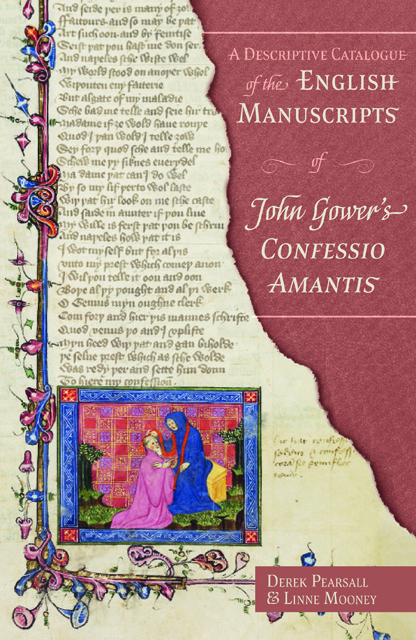Book contents
- Frontmatter
- Dedication
- Contents
- List of Illustrations
- Foreword
- Acknowledgements
- List of Abbreviations
- Introduction
- Descriptions of Individual Manuscripts
- Manuscripts in the United Kingdom
- Manuscripts in Continental Europe
- Manuscripts in the United States of America
- Appendix I Summary List of Manuscripts, with date, lines missing, other contents and note of Macaulay’s classification; with Fragments (brief descriptions) and Extracts listed at the end
- Appendix II Manuscript Sigla used by Macaulay, in alphabetical order
- Appendix III Gower’s Latin Addenda to the Confessio and other pieces, not by Gower, that appear in Confessio Manuscripts
- Works Cited
- Index of Manuscripts
- General Index
- Volumes Already Published
- PlateSection
7 - Cambridge, Trinity College, MS R.3.2
Published online by Cambridge University Press: 04 January 2024
- Frontmatter
- Dedication
- Contents
- List of Illustrations
- Foreword
- Acknowledgements
- List of Abbreviations
- Introduction
- Descriptions of Individual Manuscripts
- Manuscripts in the United Kingdom
- Manuscripts in Continental Europe
- Manuscripts in the United States of America
- Appendix I Summary List of Manuscripts, with date, lines missing, other contents and note of Macaulay’s classification; with Fragments (brief descriptions) and Extracts listed at the end
- Appendix II Manuscript Sigla used by Macaulay, in alphabetical order
- Appendix III Gower’s Latin Addenda to the Confessio and other pieces, not by Gower, that appear in Confessio Manuscripts
- Works Cited
- Index of Manuscripts
- General Index
- Volumes Already Published
- PlateSection
Summary
Confessio Amantis, missing forty leaves at beginning; written by five scribes working concurrently from a divided exemplar. Also ‘Explicit iste liber’, ‘Quam cinxere’, Traitié, Carmen super amoris multiplici varietate, ‘Quia unusquisque’, Carmen super multiplici viciorum pestilencia.
s.xv, first quarter
Contents
1
(fols 1ra–147va) Confessio Amantis, II.2687–VIII.3172
To whom the lords doon homage < > Oure ioye may ben endeles
The text is complete after missing five quires from the beginning, except V.7499–7544 omitted where a column is left blank on fol. 84 between stints of Scribes E and A.
Prologue missing; Book I missing; Book II begins at line 2687 (fol. 1ra); Book III (fol. 5va); Book IV (fol. 20vb); Book V (fol. 42rb); Book VI (fol. 85vb); Book VII (fol. 99rb); Book VIII (fol. 130ra).
Text collated by Macaulay (sigil T): IIb. He says the text is closely akin to Oxford, Bodleian, MS Bodley 294 (written by Scribe D of the Trinity MS). The contents of the Trinity MS are identical with those of Bodleian, MSS Bodley 294, and Fairfax 3, BL, MS Harley 3869, Nottingham UL, MS WLC/LM/8 and Princeton UL, MS Taylor 5.
For further information about the following Latin and French addenda that Gower caused to be added to MSS of the Confessio, see Appendix III.
2
(fol. 147va) ‘Explicit iste liber’
Explicit iste liber < > sub eo requiesce futurus
Later six–line version with dedication to the earl of Derby.
Macaulay (ed.), Works, III.478.
3
(fol. 147va) ‘Quam cinxere freta’
Quam cinxere freta < > stat sine meta
With rubric ‘Epistola super huius’
Macaulay (ed.), Works, III.479.
4
(fols 148ra–152ra) Traitié pour essampler les amantz marietz
Puisquil ad dit cy deuant < > saluement tenir (prose rubric) Le creatour de toute creature < > lamour parfit en dieu se iustifie Quis sit vel qualis < > omne latus (concluding rubric) Macaulay (ed.), Works, I.391–92.
5
(fol. 152rb) Carmen super amoris multiplici varietate
Est amor in glosa < > adhibo thorum
Macaulay (ed.), Works, IV.359.
- Type
- Chapter
- Information
- Publisher: Boydell & BrewerPrint publication year: 2021



